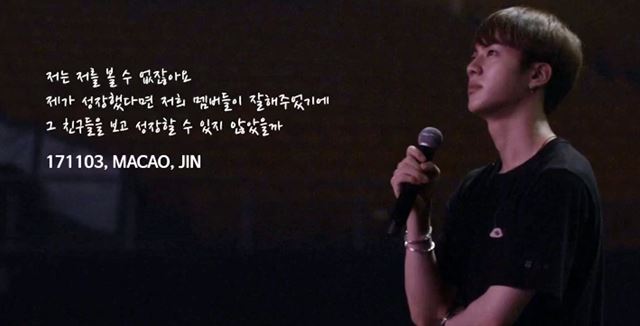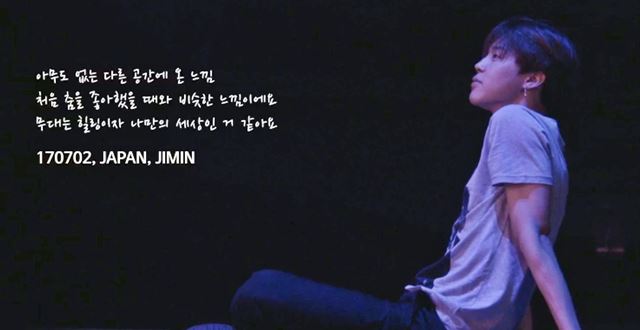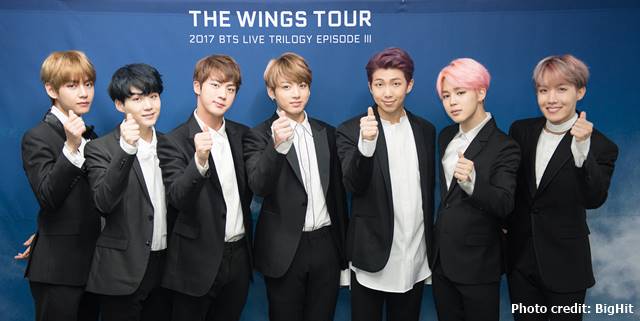By Jae-Ha Kim
jaehakim.com
May 11, 2018
![]()
Moreso than any of the previous episodes of “Burn the Stage,” this finale is a love letter from BTS to their fans.
The eight-part docu-series ended with “Spring Day” playing over the credits. As many of you already know, that song touches my core every single time I hear it, so I’m a little verklempt as I write this.
Suga, a self-professed loner, gave up his privacy to live with six strangers 24/7. Not being alone was difficult for him to get used to. In retrospect, you can say that of course he made the right choice. But back then, there was no guarantee that BTS would become so popular.
The members are in agreement that Jin gets a chance to show off his personality during their concerts. As he stands on stage, ripping out his (paper) heart for fans, the group is in stitches at his corny, but adorable, show of affection.
His puckish sense of humor is on display again later, as the group enjoys a delicious carry-out meal in their hotel room. (I have to say that I love to watch them eat. It’s Eat Jin x 7, which is A-OK by me.) When Jimin leaves to use the restroom, Jin says, “Make it look like he left.” And had the editors done his bidding, viewers would’ve assumed that Jimin left hours ago to go to bed. To Jin’s delight, Jimin calls him out on it. It’s funny, because the teasing wasn’t mean-spirited, but rather familial.
One of the recurring themes in “Burn the Stage” is how the band members comfortably joke around with each other, but rarely take it to a level where they will hurt others with their words. There is a Korean word called 눈치 (noonchi). (눈 literally translates to eyes.) The closest English word or description I can think of would be tact; or the ability to read a person’s wishes without their saying so.
An example of 눈치: Being offered to stay for a meal. In many cultures, that invitation would be taken at face value. But in Korean society, the invitation is often extended as a courtesy and the recipient is expected to politely decline (at first). Noonchi is the ability to hear the invitation and gauge your surroundings — Did they already set the table for their family members only? Is there enough food to feed an A.R.M.Y. (pun intended!)? — before answering. A person who doesn’t have noonchi will sit down to eat without realizing that there is very little food at an already crowded table.
I displayed a lack of noonchi during a recent trip to Korea with my family. As my cousin was driving us back to our hotel in Busan, I asked if he had a stick of gum for my son. He apologized and said he didn’t. I didn’t think anything of it. A few minutes later, he pulled up to the nearest convenience store, went in and came back with 5 different packs of gum, snacks and drinks. He thought that my asking for gum was my way of hinting that my child was still hungry. (He wasn’t!) But because he didn’t want me to think I had burdened him, he took a stick of gum for himself and said he had wanted it, too.
The seven young men in BTS have great noonchi. In situations that could become overly confrontational, they assess the situation and choose their words wisely. This doesn’t mean they don’t argue. They do. But living together without tact would be disastrous.

In his one-on-one interview, Jin says he didn’t want to be an entertainer growing up. His goal was to become a businessman, like his father. But after watching a particularly good Korean drama, he decided to try acting instead.
Score 1 point for K-Dramas!
“I had zero interest in becoming a singer,” he says. “I’m not exactly a prodigy, but I work hard at it.”
Jin is so comfortable on stage as a performer that it would be a shame if he didn’t fulfill his dreams of becoming an actor one day.
Jimin graciously adds that watching Jin’s industriousness has encouraged him to do better and grow as well.
True story: Jin’s voice is my favorite amongst those in the vocal line. Though each has his own strengths as a singer, Jin’s vocals have a timbre that I find not only appealing, but comforting as well.
Jin also points out how touched he is when he hears non-Korean fans singalong with them in concert. He said he knows they have to learn the lyrics phonetically and compliments the effort they put into doing so.
I thought about how English is shoved on Korean students from a very young age. Some, like RM, are prodigies who will teach themselves to master the language. Others may have parents who have the means to send them overseas to Australia, Canada or the United States to learn to speak English better. But most Koreans will struggle with it, because English doesn’t make much sense and is an incredibly difficult second language to learn.

Always the realist, Suga knows that their level of popularity won’t last forever; that their youth will be gone in a few years; and that there’s no guarantee their fans will remain with them. On stage, Suga breaks down in tears, saying that they started out with the modest hope of sharing their music — and they have turned that hope into reality.
RM echoes that sentiment, saying he would like their fans to grow old with them.
I’m going to take a moment here to say something about young, female fans. There are so many bands that are almost resentful of having young fans. They revel in pointing out that they have a lot of men showing up at their concerts, as if having male fans is a bigger mark of relevance than girls showing up. As the mother of a boy, I ask: Why is a boy’s opinion on pop culture considered more valuable than a girl’s?
Why is it that men getting drunk and screaming for their favorite sports hero is acceptable, but young women liking a boy band is something to make fun of?
I was heartened to hear BTS say that they wanted to grow old with the fans they had. They didn’t say they wanted to swap the fans out for older A.R.M.Y.s or men.
Shortly before their performance in Macau, Big Hit released this statement:
“Yesterday on November 3, Jimin experienced some cramps in his neck and shoulder while flying over to Macau. Immediately upon arrival, he was taken to a local emergency room to undergo some medical examinations and treatment.
“After going through another checkup this morning, there were no abnormal findings but we were told that Jimin should avoid any strenuous physical activity. Therefore, Jimin will not be participating in performances with choreography, along with some other stages.
“We sincerely apologize for causing worry among fans who’ve been waiting for their Macau concert. Thank you.”
Even though it was suggested that he skip the show and heal, Jimin said, “No.” He said his not being on stage would make the fans worry more about his health, and he wasn’t about to do that. He also was cognizant of the fact that he didn’t know when they would perform there again.
The band figured out a way to include him, while allowing him to rest on stage.
I’ve talked about their strong work ethic before, but I also believe there is something to their Korean upbringing that makes them push through their pain. My parents never missed a day of work, because you just don’t do that, even if you’re sick. I think about a snow day we had in Chicago when I was in high school. My father dropped me off, even though the news had reported that it was closed. Having lived through so many hardships in Korea, he couldn’t believe that school would be closed for a “little snow.” He said that if students show up, they will teach us.
Nope. The custodian who opened the door told me to go back home. I waited for the bus to head back to our house, so that my dad wouldn’t be late for work.
In many ways, I feel that what Jungkook said applies to many things in life: “We’ve been lucky, but we worked hard for that luck.”
Yes!
Airdates: The eight-episode series premiered on March 28. The finale will air on May 9, 2018, on YouTube Red. Read more of my reviews of “BTS: Burn the Stage” here: Episode 1 & 2. Episode 3. Episode 4. Episode 5. Episode 6. Episode 7. My review of “Burn the Stage: The Movie” is here.
🇰🇷“We’ve been lucky, but we worked hard for that luck.” @BTS_twt caps off its #BTSBurnTheStageFinale w/a love letter to their fans & stress their desire to grow old w/ARMYs. They exhibit great 눈치 as they navigate their daily lives. My last review:⏯https://t.co/csGPr4mQRF📌 pic.twitter.com/wWeXTAsL3Q
— Jae-Ha Kim 김재하 (@GoAwayWithJae) May 11, 2018
© 2018 JAE-HA KIM | All Rights Reserved







💖💗💗💗💗💓💓❤️
Having rewatched the series again on the heels of their meteoric return to the BBMAS and new album…I would please ask your opinion on the longevity of the group as I have been reading about the history of k-pop and the emphasis on youthful stamina that it takes to both maintain their rigorous schedule and demand of the huge fanbase and wonder if BTS will be able to extend their shelf life beyond that of most groups. I do hope so but I wonder if it’s physically possible… I’m old af so I hope the army doesn’t come for me for asking the question as the band is skyrocketing right now. Also relevant side note- I have a soft spot for Jin as the eldest member esp when he candidly explains how hard he works at all the dance moves. AND then I read 25 is usually considered peak age for a pop idol so then I started to wonder even more about Jin.
Watching the stateside interviews I do fear he’s a bit misunderstood for his handsome bravado which I think western media doesn’t really get imho. Even I mistook it as first but having watched countless run episodes I see he has a lot of heart and talent. And all the cute kidding they do esp on their run episodes aside, it occurs to me it might be a double edge sword to be the eldest of a boy band when you know time is not on your side and Even RM said in the post interview on the WINGS DVD that he looked forward to a time he could perform a song without worrying about dancing…things old dogs like me can relate to. Anyways if u had any insights I would love to read them, most sincerely… and thx again for your reviews…I enjoy rereading them like cliff notes when watching the episodes!